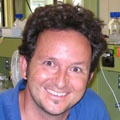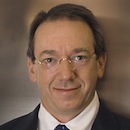Advisory Board and Editors Oncology

Enza Lonardo
I obtained my Bachelor in 2003 in Plant Biotechnology at University of Naples Federico II under the supervision of Dr. Roberto Defez at IGB.
In 2008, I obtained my PhD at University of Naples Federico II under the supervision of Dr. Gabriella Minchiotti at IGB working on Cripto signaling in embryonic stem cells.
In 2009 I moved to Madrid where I started my first postdoc in Christopher Heeschen lab at CNIO where I was working on TGF-beta in pancreatic cancer.
In 2012 I moved to Barcelona at IRB as Senior Postdoc in Eduard Batlle lab working on TGF-beta signaling in colorectal cancer.
Since February 2017 I joined the IGB as Group Leader to study the tumor-stroma crosstalk mediated by TGF-beta in gastrointestinal cancer (pancreatic and colorectal).

Ian J Majewski
My research group is working to identify genetic mutations that contribute to the development of leukaemia, and studying how these mutations influence a patient’s response to therapy. The cancer landscape is both complex and dynamic and we're using genomic approaches to study how cancer cells evolve in response to treatment.

Fabrizio Mattei
Dr. Fabrizio Mattei graduated from University “La Sapienza” in Rome and completed his specialization in biotechnologies and oncology at the same university. In 2000, he became a fellow at the Edward Jenner Institute for Vaccine Research in David Tough's laboratory (Newbury, U.K.), where he acquired experience in the field of dendritic cell immunology. He is currently a Researcher, Group Leader and Principal Investigator at the Istituto Superiore di Sanità (Rome, Italy), where he has focused on the molecular interactions between dendritic cells and type I Interferons signalling.
His current research is aimed at understanding the role of Interferons signalling and IL-33 in the interface between tumor and immune system in both mouse and human models. Furthermore, he is also conducting research aimed at investigating on crosstalk between immune system and cancer by Cell-on-Chip devices. In addition, Dr. Mattei is developing a multidisciplinary laboratory network focused at the realization of Organ-On-Chip platforms, useful to mimic and study human diseases and cancer.

Michal Mego
Dr. Michal Mego is an Associate Professor at the 2nd Department of Medical Oncology, Faculty of Medicine, Comenius University, National Cancer Institute, Bratislava, Slovakia. He is also a Head of the Translational Research Unit, National Cancer Institute, Bratislava. Dr. Mego's research interests include Circulating tumor cells, Breast Cancer and Testicular cancer.

Carla Minoia
Dr. Carla Minoia is a MD at IRCCS Istituto Tumori "Giovanni Paolo II" Bari (Italy). Her PhD involved clinical research on lymphoma, survivorship, and quality of life.

Eduardo Moreno
Eduardo Moreno received his PhD in 2000 for research performed with Ginés Morata at the CBMSO, Spain. He stayed there for another 18 months as a postdoc before moving to Zurich, Switzerland, to continue his postdoc with Konrad Basler. From 2004 to 2010, he was a group leader at the CNIO in Madrid, where he received an ERC Starting Grant Award in 2007. Eduardo is at the Institute of Cell Biology in Bern, Switzerland, since 2011. He received the prestigious Dr. Josef Steiner Cancer Award in 2011.

James J. Mulé
- Executive Vice President and Associate Center Director for Translational Research
- Michael McGillicuddy Endowed Chair for Melanoma Research and Treatment
- Co-Director of the Donald A. Adam Comprehensive Melanoma Research Center at the Moffitt Cancer Center.
Dr. Mulé is recognized for his research and clinical contributions to cancer immunotherapy, particularly in solid tumors. He has published nearly 200 articles in the areas of cancer vaccines and cancer immunotherapy; and he has been an NCI-NIH investigator continuously for nearly 20 years.
Dr. Mulé serves on the advisory board of M2Gen, a wholly-owned subsidiary of the Moffitt Cancer Center in the area of personalized medicine in oncology, which he helped to establish; the Board of Directors of Medicine in Need, Cambridge, MA (a non-profit spin-out of Harvard University, and selected as a 2011 Technology Pioneer by the World Economic Forum); and the advisory boards of several NCI-designated Cancer Centers and was a member of the NCI Director’s Board of Scientific Counselors (BSC-A, clinical), remaining a long-standing special government employee to the FDA and the NCI; the scientific/medical advisory boards of several private and public companies where he also served as a consultant; and he chaired the FDA’s CBER Cellular, Tissue, and Gene Therapy Advisory Committee.

Tomoki Nakamura
I am a lecturer of Orthopaedic Surgery at Mie University Graduate School of Medicine. I graduated from Mie University Faculty of Medicine in 2002 and received my PhD in 2009. I am a member of the Japanese Orthopaedic Association and a specialist in Orthopaedic Oncology. I typically treat patients presenting with bone sarcoma, soft tissue sarcoma, and metastatic bone tumors. I am also the academic editor of several journals, including PLOS One, BMC Cancer, Oncology Reports, Oncology Letters.

Corey Nislow
Corey Nislow's laboratory develops and uses cutting edge tools to address this central question: how can we understand the biological commonalities in all of the life sciences; from embryonic development, to the spread of infectious diseases to better ways to treat cancer. Each of these disciplines can be explained in the context of competition, interaction and evolution. His lab studies the interface between genes and the environment using parallel genome-wide screens, high throughput cell-based assays and next generation sequencing. Most recently, he and his scientific partner, Dr. Guri Giaever, are exploring how laboratory experiments can co-opt evolutionary processes to understand drug action. He enjoys teaching all aspects of biotechnology, genomics and drug discovery. He got his PhD from the University of Colorado, worked at several Biotechnology companies and was at Stanford and University of Toronto before joining UBC in 2013. He has published 161 papers and run 19 marathons.

Nijiro Nohata
Nijiro Nohata, M.D., Ph.D. Principal Scientist of Oncology Science Unit, MSD K.K., Japan. Active member of ASCO, ESMO, JSMO, JCA

Houtan Noushmehr
Associate scientist and professor of epigenomics and bioinformatics at the department of neurosurgery and genetics.

Lorraine O'Driscoll
Lorraine O'Driscoll (BSc(Hons, Pharm), MSc(Res, Clin Pharm), MA(Ed), PhD(Biotech), FTCD) Lorraine holds a BSc(Hons),pharmacology; MSc(Res), clinical pharmacology; MA, education; PhD, biotechnology. In 2012, she was elected to Fellowship in TCD. Following her PhD, Lorraine undertook biotechnology/biomedical research for US and EU industry (including Berlex; Archport Ltd-Axonobel; MediSyn Ltd; MedaNova Ltd.) before returning to academia. At post-doctoral level, she gained experience at the Dana-Farber Harvard Cancer Institute and University of Miami. Prior to joining TCD in 2008, Lorraine most recently held the position of Senior Research Programme Leader and Lecturer in School of Biotechnology, DCU.
Her research group focuses on diagnostic, prognostic and predictive biomarkers; discovering new therapeutic targets; cancer cells communication via exosomes, microvesicles and CTCs; elucidating and circumventing resistance to targets agents and classical chemotherapy; associations between obesity, metabolic syndrome and cancer.
She has been a P.I. on 5 cancer clinical trials with ICORG. She is TCD's Principal Investigator on SFI-supported Molecular Therapeutics for Cancer Ireland; Strand Leader of Irish Cancer Society-supported Breast-PREDICT; and P.I. and Chair, H2020-supported European Network Cooperation in Science and Technology focussed on Exosomes & Microvesicles in Health & Disease which brings together researchers from around the world, in academia and industry.

